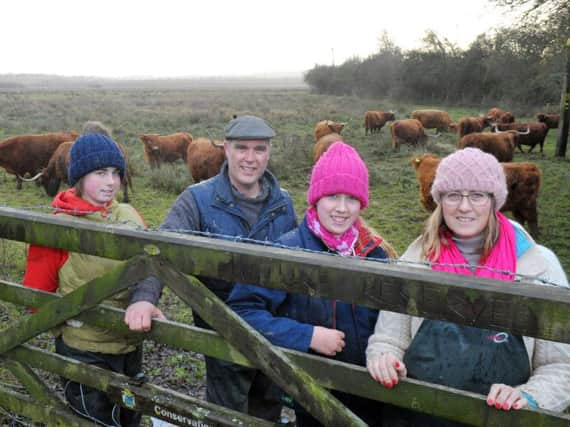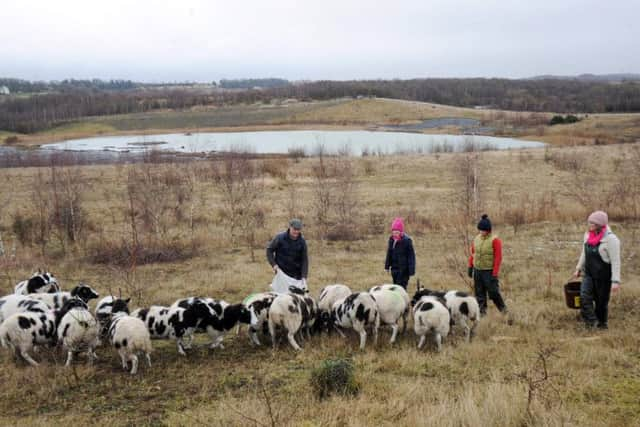Couple who sold their house and moved to a bare field to finance their rural dream


There have been several initiatives during the years I have written about farming to help new entrants who have no familial farming heritage put their foot on the first rung of the farming ladder.
The truth of the matter is that becoming a new entrant into agriculture regardless of any leg-up, from wherever it comes, can indeed be extremely difficult and requires great reserves. It’s not just about finance but strength of mind and body, for when the going gets tough and when curve balls such as BSE, foot and mouth disease, increased red tape and planning permission by authorities appear as additional hurdles along the way.
Advertisement
Hide AdAdvertisement
Hide AdPeter and Amanda Shaw began their farming journey when they acquired 23 acres of land – no house – at what is now Fryston Common Farm, in 1991.


Peter ran a skip hire business from their home town of Castleford. They sold their house to afford the move to what was literally a bare field and switched their lifestyle from urban to rural.
Today, their farming enterprise includes a further eight acres acquired close to the original acreage; an additional 70 acres acquired at one of the nearby villages of Fairburn; and a grazing operation across the RSPB land at Fairburn Ings.
Surge in popularity of farm shops 'vital' to sustaining agricultural sectorStrictly Come Dancing and Springwatch presenters support project to save endangered Turtle DovesTheir farming business now encompasses arable crops grown for their livestock, calf rearing, sheep and cattle on a mix of land that has also seen them latterly move towards rare and heritage breeds.
Advertisement
Hide AdAdvertisement
Hide Ad“We were young and foolish,” says Amanda. “We were in our early 20s and just thought we’d have a go to try and make it work. We hadn’t seen ourselves as farmers before we came here. We were outdoor people who liked walking and had an allotment growing vegetables, but that had been about it. There was no family background to call upon.
“We put up a building so that we could start calf rearing and entered into an agreement with a company that saw five-to-ten days old baby calves coming to us. We would rear them on to 16-20 weeks at which point we would sell them back to the company.
“We were handling abut 90 a year at first. We’d started with the calves because by showing a commitment to the land for agricultural purposes we could build a house here.”
Obtaining planning permission and the subsequent building of their farmhouse took 13 years with Peter and Amanda living out of a caravan and portable cabin in the intervening years. Their farming operation increased significantly around 2003.
Advertisement
Hide AdAdvertisement
Hide Ad“When Sid Bramley’s farmland at Fairburn came up for sale about 16 years ago we felt it would make us look more like a viable farm.
“We’d had a few sheep at Fryston Common but that’s when our sheep enterprise started properly and we now have a flock of around 175 Lleyn X breeding ewes. We also converted the Fairburn land to organic.
County farms in Yorkshire being sold off as austerity bites, warns Campaign to Protect Rural England“We started our organic flock with pure Lleyns having bought our original ewes from the Lleyn Peninsula. We’ve since used different tups on them to create the size and type of lamb that will sell at York or sometimes Selby livestock markets.
“We went down the Beltex route to start with and they produced a shapely lamb, but too small for the livestock markets who saw them as tiddly things, so we’ve now gone down the route of Charollais tups to get the size back in.
Advertisement
Hide AdAdvertisement
Hide Ad“One of the Charollais we’ve used this time is a really big bruiser. This time out we have also tried a Suffolk tup for the first time. We purchased both our Charollais and Suffolk tups from Chris Timm who was until recently at Appleton Roebuck.”
As well as addressing the size of lambs issue, Amanda tells of another area where she is also making headway.
“Our lambing percentage was below what would have been expected for Lleyn and Lleyn X ewes.
“We’ve worked with our vets, Westpoint based at York Livestock Centre in Murton, and found that the land was locking in the minerals. We are now using boluses which is helping us achieve a better average.”
Advertisement
Hide AdAdvertisement
Hide AdCalf rearing and the growing Lleyn X fat lambs for market became the Shaws two main farming planks in addition to Peter’s income from haulage, which has provided the lion’s share of their income for some years. But their most recent addition to their enterprise has been the conservation grazing undertaken at the RSPB centre at Fairburn Ings, which now sees them promoting grass fed, naturally reared beef and lamb.
“I was quite surprised we were the ones who landed the right to graze it. The land is next door to our farmland in Fairburn and that’s what made us put ourselves forward when an expression of interest came up.
“We currently have 30 Highland cattle, a couple of Dexters, half a dozen Herdwick ewes and around twenty each of Whitefaced Woodlands, Wiltshires and Jacobs.
“We fluctuate between 30-50 Highlanders and have had more Dexters, whose beef sells really well in our boxed schemes. We are looking to take on Longhorns too.
Advertisement
Hide AdAdvertisement
Hide Ad“The Herdwicks are mine but the rest of the sheep on the Ings are our girls’ Fran, 15, and Delia, 14. We lamb our main flock of Lleyn X at Easter and they both help.”
Making more direct sales through their own produce marketed as Monk Fryston Farm Partners is the aim. Joining Deliciouslyorkshire has been one step, another has been and continues to be working with Charlotte at Bert’s Barrow.
Peter and Amanda are looking forward all the time, but Amanda is also proud of her heritage.
“My father was a coal miner from the old Fryston village. The pit house where he lived overlooks where our livestock now grazes. It’s nice to show him what we are doing.”
www.monkfrystonorganics.co.uk